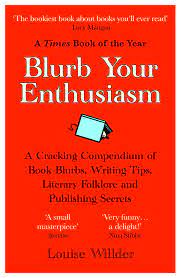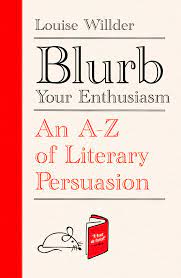Blurb Your Enthusiasm (2022) by Louise Wilder
Good Reads meta-data is 352 pages rated 4.16 by 185 litizens.
Genre: Non-fiction (though some of the stories belie that).
DNA: Bibliomania.
Verdict: Snappy!
Tagline: Occam did it.

The world beyond wherein are produced those tantalising paragraphs on the back of books, those lures cast on book-selling web sites, the too-good-to-be-true hooks in advertisements. These are the blurbs. Who hasn’t bit on one of those baits…and read to regret it?
They run to a hundred words plus or minus, one. The discipline is strict and stern in this sweatshop. T. S. Eliot’s day job was to do just that, write blurbs for Faber and Faber. No wonder he went cryptic with his poetry at end of a day. He wrote 5000 published blurbs, and countless drafts (some of which were probably better than the copy used, but excellence does not always prevail).
Within those one hundred words a copywriter summarises the book honestly but in such a way as to market it to a buyer. It’s like introducing someone at a party, emphasis on the positive, on the common ground, on the best side…. No comment on the negatives. Don’t mention the short-temper, the habitual tardiness, the slovenly home, the relentless egotism, the jail time, the snobbery, the cheating at cards, the nose picking, the carelessness in driving a car….
It is best if the blurb reflects the nature and manner of the text within the book. No high fluting terminology for a down and dirty book, nor vice versa. Last, but not least, the blurb must satisfy its first reader, the author, or failing that, the even higher authority of the publishing editor. Few authors insist on writing their own blurbs and still fewer publishers let them, because the marketing department knows best.
Here’s a bet. Next time you are fondling a new book, read the blurb and see if you can tell who wrote it, the author or a hack copywriter? Those by authors use – shutter – adjectives, while hacks stick to the facts of the text. (Pssst, authors have even been known to use, ahem, adverbs.) If the story is set in Berlin, a hack will say ‘Berlin,’ while an author will embellish that as ‘wintry Berlin.’ See the difference. Authors seldom resist backstories, hacks have taken the oath to do so. The hack writes ‘Berlin. Joe had to…’ The author wants more, so ‘Tall and elegant Joe found himself in very wintry Berlin to…’ The one hundred word guillotine falls on the author’s blurb before it gets to a punchline. A hack is tempted to put the punchline first to get attention and then backfill.
Authors are prone to describing the book, in superlatives: ‘outstanding,’ ‘incredible,’ ‘brilliant,’ ‘amazing.’ These terms are used for everything these days and so have been emptied of significance, but they persist like semantic ghosts to offer a substitute for meaning. Indeed some book-covers are so crowded with such empty calories of praise that there is no room for a few words for what the book is about. By Gresham’s Law, cheap words drive out valuable ones.

The hack blurb writer sometimes has to start with a draft blurb from the author, and applies Occam’s razor. Slash!
Blurbs have always been with us but they have changed over time. Once they were more like tables of contents, then for a while they were displaced by quotations from other writers and critics praising the book with adjectives and adverbs as above! These Masonic salutations tended to zero credibility and now appear, if at all, as supplements.
However, it is a baleful truth that publishers have lately began to mimic the promotional pitches for movies, with such meaningless remarks as ‘in the tradition of [last year’s box office success],’ which means derivative, ‘based on a true story,’ which means it isn’t, and ‘if you liked [ … ], you will like this.’ I may have liked one but find that to be quite enough, no more thanks. (Buy a toilet seat from Amazon, and you’ll see. Thereafter you will be followed to your grave by Amazon’s suggestions of other toilet seats you might like!) Commercial algorithms assume consumers are single-track obsessives.
The prose is spritely, the insights sharp, the chapters short. What’s not to like.
Aside on discipline. I recently had to write a synopsis of a book in 300 characters, and a space counted as a character. It took me two weeks of editing to get something adequate.

